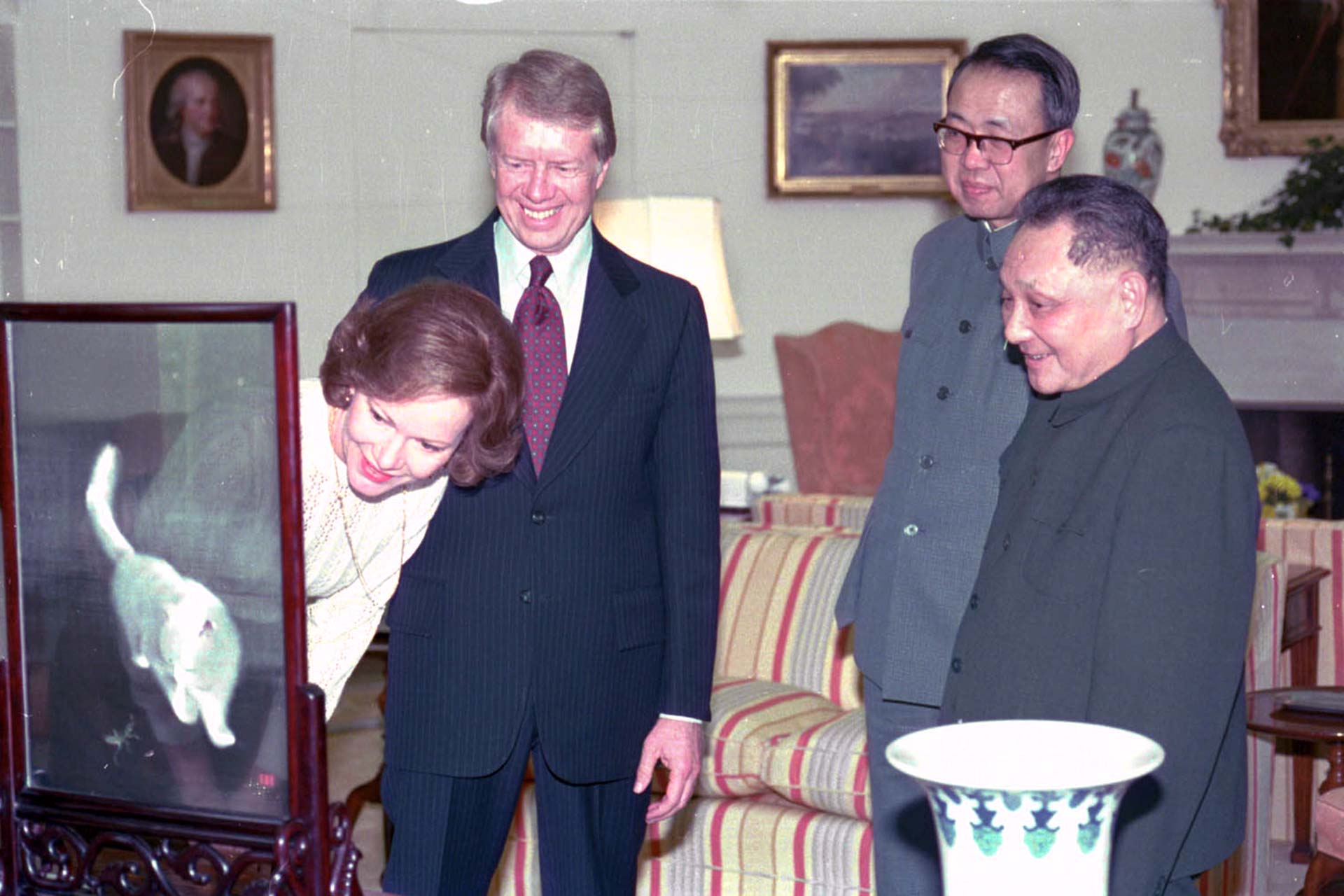
From the personal to the political, President Carter reflects on our nation’s – and his own – relationship with China
Excerpted from the Shanghai Institute of American Studies' "Forty People, Forty Years" series commemorating the 40th anniversary of diplomatic normalization between the United States and China.
Question: Despite years of efforts by your predecessors, it was during your presidency that China and the U.S. established formal diplomatic relations. When you took office in 1977, there still existed quite strong political resistance against normalization within your administration. What made you so determined to proceed with normalization?
I believed that the normalization of relations between our two nations would advance the cause of peace in Asia and the world. The People’s Republic of China comprised about one-fourth of the world’s total population and played a major role in international affairs. That reality needed to be officially recognized by my country.
Furthermore, it was clear to me that both the Chinese and American people would benefit greatly from the commercial and cultural relations that normalization would bring. I also was confident that normalization would include a renewal of the historic friendship between us.
During my 1976 presidential election campaign I had announced my commitment to pursue normalization. After my election, the people who joined my administration supported that commitment.
Presidents Nixon and Ford had faced political resistance to normalization from members of the U.S. Congress who wanted to maintain a close relationship with the government of the Republic of China in Taiwan. Those two presidents held back. I did not intend to allow this resistance to prevent me from moving ahead, but I wanted to move at the right time.
This came about as Deng Xiaoping emerged as the paramount leader of China. For him, normalization was as important a goal as it was for me. Also, in 1978, my administration had moved ahead with two other major diplomatic goals. After negotiating the two Panama Canal Treaties, we had secured Senate ratification of them in the spring. This had been an extremely difficult and controversial challenge. Then in September, I had taken the leaders of Israel and Egypt to a summit meeting from which came the Camp Accords, A Framework for Peace in the Middle East. It was time for the US and China to move ahead as well. We announced our agreement simultaneously in Beijing and Washington, on Dec. 15 and 16, 1978.
Following the welcoming ceremony, President Jimmy Carter and Vice Premier Deng Xiaoping head to the Oval Office and later the Cabinet Room for meetings. (Photos: Jimmy Carter Library)
Question: During the process of negotiations, a number of disagreements arose that required management by both countries – the subject of Taiwan, for example. What do you consider as the biggest challenge?
Taiwan definitely was the biggest challenge we faced throughout the negotiations. We recognized that for the People’s Republic of China, its relationship with Taiwan was considered a domestic issue. Nevertheless, the American people had had an extensive, close, and friendly association with the Taiwanese people. It was important that this be continued through nongovernmental means. We also intended to state publicly that the ultimate relationship between mainland China and Taiwan should be settled peacefully.
Rather than selecting a career diplomat as my chief negotiator, I named Leonard Woodcock, who had proven his negotiating skill as the head of the United Auto Workers, a major American labor union. I sent him to Beijing with the rank of ambassador.
Rather than immediately and directly confront the sensitive issue of Taiwan, Woodcock proposed that we obtain early successes on the less controversial issues, which would set the tone for the two sides to settle the hard issues involving Taiwan at the end of the process. This principle of elevating areas of agreement over disagreement proved to be quite effective, and constantly moved the negotiations forward.
Overall, we successfully addressed sensitive issues because everyone involved knew that the status quo was untenable. We also were aware of the benefits that normalization would likely bring – not only to our countries but to the entire world.
I believe that the same approach is relevant today. Negotiations are not about getting everything that you might want. Negotiating parties must focus on the advantages of success versus the disadvantages of failure for both sides, not just for one. China and the U.S. will always have differences of opinion, but we should reject the view that compromise, no matter how minor, is a sign of weakness. Instead, we should seek to accommodate differences to maintain the good relations Deng and I established 40 years ago.
I should add that when we announced the normalization of relations, the American people and Congress supported it. The intense opposition anticipated by some did not develop. It was recognized that the U.S. needed to accept reality and that the people of Taiwan were being treated fairly.
Question: Looking back at it now, how do you see your role in that period of history? Would you count that as one of your greatest legacies as president?
When I was inaugurated president, I promised that we would pursue human rights and peace. We kept that commitment to the American people and to the people of other countries as well.
I am proud that some of my administration’s most significant achievements involved advancing peace throughout the world. The Camp David Accords ultimately brought peace to Egypt and Israel. The SALT II Treaty with the Soviet Union lowered the risk of nuclear war. The Panama Canal Treaties vastly improved the U.S. relationship with Latin America. I consider the normalization of diplomatic relations with China as an especially historic achievement.
In my view, American leadership should, as a matter of course, promote peace and human rights. I have a dream that the first thought of any country that faces a security problem – whether it is settling a territorial dispute, an ongoing military conflict, or an agreement on arms control – would be to come to Washington for help. In my opinion, the defining trait of a superpower is not its weapons systems, strength of its currency, or how widely its language is used, but if it promotes peace and human rights in the world.
Of all that I was able to achieve during my term as president, normalization with China may have been the most beneficial to world peace and understanding. In my frequent trips to China, I can tell by how I am welcomed by China’s heads of state, provincial governors, university students, and ordinary people that they admire what we achieved.
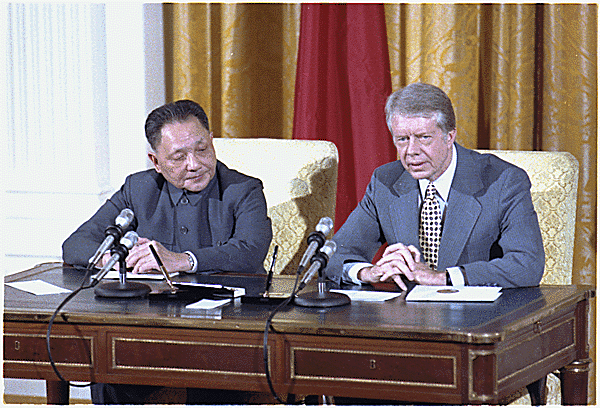
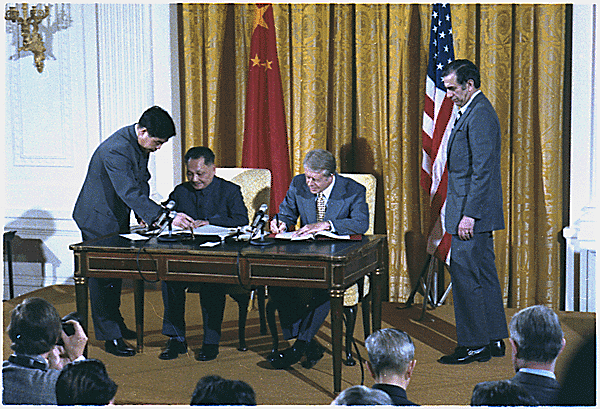
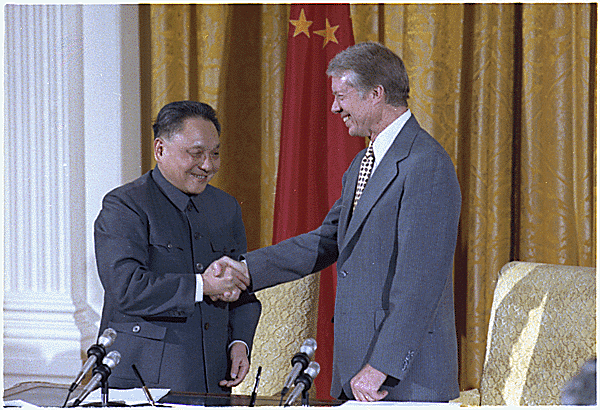
Question: Your uncle used to bring you back souvenirs from China. Was that how your initial interest in China began? When you were in the submarine force in 1949, you came here as a young naval officer to visit some of the same seaports your uncle once visited. What was your impression of China and the Chinese people then?
You are correct that my initial interest in China began as a boy growing up in rural Georgia. As a Baptist, I admired the missionaries who served there, and remember listening to a missionary visiting our church while home for a short vacation. I pledged a nickel a week to help build hospitals and schools for Chinese children.
My uncle, Tom Gordy, a radioman in the Navy, also kindled my interest when he would send me letters and souvenirs from the seaports his ship visited in Hong Kong, Shanghai, and Qingdao. Even 87 years later, I still have one of these souvenirs, a model of a Chinese junk ship. If you visit my boyhood home, part of the Jimmy Carter National Historic Site in Plains and Archery, Georgia, you can see a replica displayed prominently in my boyhood bedroom.
Later, as a young U.S. Navy submarine officer, I followed my uncle’s path and visited some of the same Chinese ports. This was during the early months of 1949, when the Nationalist forces under Chiang Kai-shek were under siege by the troops of Mao Zedong. Soon after we left, Qingdao fell, and the Nationalists began their retreat to Taiwan. Like many of my American colleagues in the Navy, I regretted this news because we had a close alliance with the Nationalist Chinese, going back to World War II.
When in China, I did see small boys and old men being recruited into the Nationalist army at bayonet point. I recognized that this did not encourage popular support for the Nationalists, but I interpreted it as indicating desperation. While I sympathized with the Nationalists, I did understand that Chinese acceptance of a Communist government was driven by more than Communist intimidation.
As president, drawing from this lesson in my personal experience, I sought to end the period of estrangement between the U.S. and the People’s Republic of China by beginning the process of normalizing relations as soon as I took office.
My personal pursuit of mutual understanding with the Chinese people has progressed since the normalization of relations. Every time I have visited since 1981, the Chinese people have welcomed me as if I were one of their own. I look forward to continuing my life-long curiosity and love for the Chinese people, and I hope that my example engenders this curiosity and love in future generations.
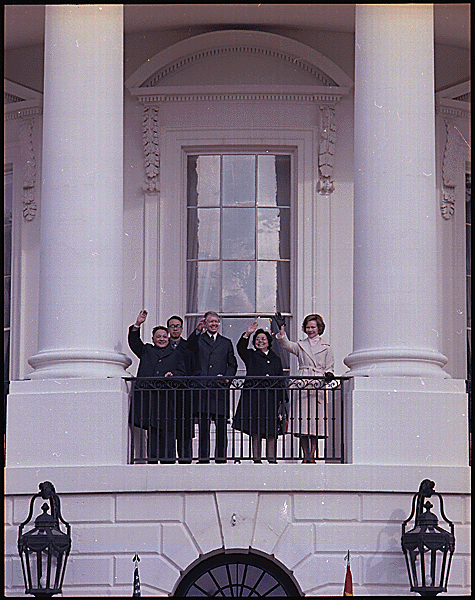
Deng Xiaoping, Jimmy Carter, Madame Zhuo Lin, and Rosalynn Carter wave from the Truman balcony overlooking the south lawn. (Photo: Jimmy Carter Library)
Question: China-U.S. relations today are confronted with circumstances quite different from 40 years ago. Do you think there are any opportunities for today’s leaders to set a new tone for this relationship in the next 40 years? What advice would you give them to keep our relations resilient and robust?
Some observers of China are saying that China is not adapting its government to become like the U.S., and therefore we should reject the principle of engagement that has served as the basis of American policy.
I would remind people who make such claims that when we normalized relations, we knew that the U.S. and China had vastly different cultures, histories, forms of government, interests, and levels of development. We acknowledged these differences and anticipated that differences between our two countries would persist. But we also believed that the goals that bound us together – mutual respect, the pursuit of peace, prosperity, and progress – were much more important than the differences that divided us.
The most important piece of advice I can give to current and future leaders in both countries is to remind them of their obligation not only to be committed to world peace but to engender that commitment in the people of their countries.
American and Chinese leaders must explain that peace is beneficial to everyone. War not only involves economic sacrifices, but also personal ones.
Young people in China have had the good fortune to grow up during a remarkably peaceful time. While this has not been as true for the U.S. as a country, most young Americans have been insulated from violent conflict since the end of the military draft. War-time sacrifices are not merely a matter of consuming less butter or driving less frequently but losing the lives of your friends and loved ones. We should let nobody forget this basic fact.
I have been told that the Chinese word for “crisis” – weiji 危机 – can be divided into two characters – one standing for danger and the other standing for opportunity. This means that in a crisis, one should be aware of the danger, but recognize the opportunity.
If there is a crisis now in U.S.-Chinese relations, I believe that opportunity can be found within the people of both countries, who are interacting with each other more than ever before. So long as Chinese and Americans deepen people-to-people interactions by attending each other’s universities and doing business in each other’s countries, they will continue to be the anchor of the relationship.
Even in the instances where disagreements between our current political leaders seem intractable, I have confidence that the people will ultimately prevail. The young professionals and students who will be our future leaders have embraced the opportunities that have been offered them. They know about each other and the reasons for harmony, cooperation, and mutual respect.
I believe that the most important bilateral relationship in the world is between the U.S. and China. I think that leaders on both sides of the Pacific should agree on this point. They know that they have no choice but to navigate through the current challenges in the relationship. Maintaining mutual respect and understanding is essential in order to address the issues facing humanity in the 21st century.
Related Resources
Key Moments in the Center’s Decades-Long Relationship with the People’s Republic of China »
Jimmy Carter Op-ed: How to Repair the U.S.-China Relationship — and Prevent a Modern Cold War »
Press Release | Carter Center Hosts Symposium Marking 40 Years of U.S.-China Diplomatic Ties »